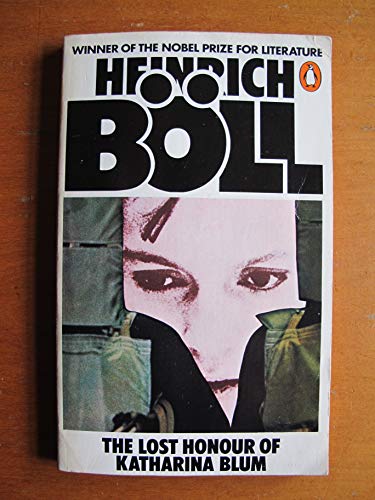With Heinrich Böll (1917-1985), we encounter our second Nobel Laureate of the semester, and the novel we'll be reading — The Lost Honour of Katharina Blum (1974), perhaps his best known book — is especially interesting in that it's the first book that he published after winning the prize in 1972.
Böll was a major figure in establishing West German culture in the aftermath of WWII, working as both an author and (with his wife, Annemarie Cech) a translator. His pacifist parents lamented the rise of the Nazi party and kept him out of the Hitler Youth, though eventually he was forced to serve in the German military, where he was wounded four times before eventually being apprehended by Allied forces close to the end of the war in Europe.
He took a chance on writing and in a cultural void left by the war's widespread devastation, quickly rose to national and eventually international prominence, largely due to his sympathetic depictions of the struggles of individuals set against a broader array of socio-political challenges. To the west, he was a symbol of rebirth after the scourge of Nazism, and he was tremendously popular within the Eastern Bloc for his criticisms of capitalism. Indeed, Böll's perspective was a singular and uncompromising one: while he remained a devout Catholic for his entire life he was condemned for his criticisms of the Catholic church, and his liberal ideals and disdain for authoritarianism made him enemies within West German conservative circles.
One such controversy helped shape The Lost Honour of Katharina Blum. In the early 70s, West Germany was shaken by the actions of the RAF (better known as the Baader-Meinhof Group, a cadre of leftist terrorists opposed to the government's authoritarian policies, widespread employment of former Nazis, and involvement in colonialist struggles). While reactionaries within the country called for swift justice, Böll was part of the minority of public intellectuals calling for due process the proper adherence to the country's democratic legal doctrines. In return, he was savaged in the media and branded a terrorist sympathizer. So too is the novel's titular heroine drawn into forces beyond her control and hounded by both a relentless police state and the sensationalist news media until, in short order, her simple and innocent life is destroyed.
Here's how we'll divide up our three classes on Böll:
- Fri. September 29: introduction and chapters 1–23
- Mon. October 2: chapters 24–40
- Wed. October 4: chapters 41–58
Here are some additional resources that might be helpful:
- "A Sorrow Beyond Dreams," The New York Times' 1975 review of this novel and Peter Handke's A Life Story: [link]
- Böll's 1972 Nobel Prize Commendation: [link]
- His speech upon receiving the Nobel Prize: [link]
- Böll's 1985 obituary in The New York Times: [link]
- A 2009 article in The Guardian about the loss of Böll's literary archives: [link]



No comments:
Post a Comment